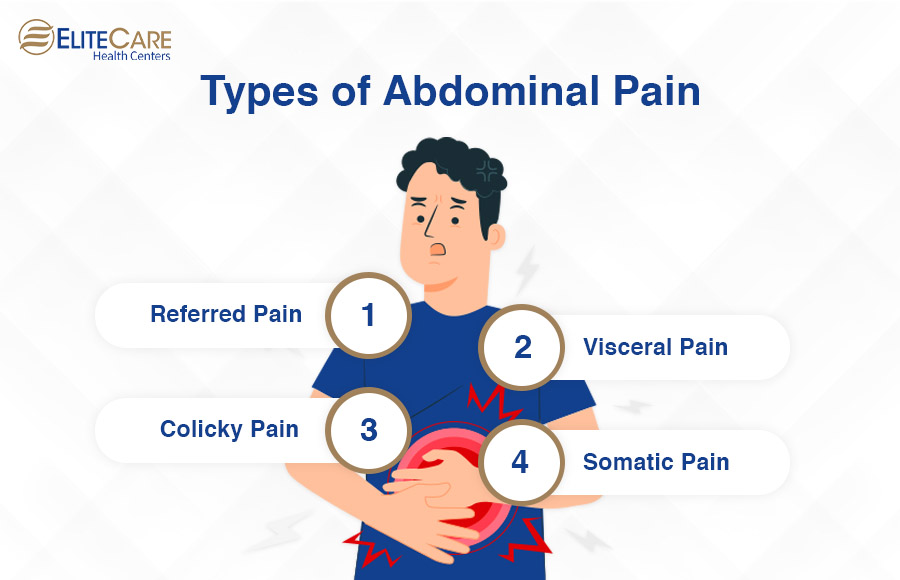
Abdominal pain is a common complaint that can be caused by a variety of diseases ranging from benign to significant medical problems. The abdomen contains a complex network of organs, each of which is vulnerable to numerous disorders that might appear as discomfort.
One of the most common reasons patients attend urgent care centers is abdominal pain, which can occur anywhere between the chest and the lower abdomen.
EliteCare Health Center’s medical professionals offer immediate assistance and direction in dealing with abdominal pain. However, it is essential to educate yourself on the subject and be conscious of the type of pain you are feeling.
Anatomy of the Abdomen
It is important to understand the structural makeup of the abdomen before getting into the intricacies of abdominal pain.
The right upper quadrant (RUQ), left upper quadrant (LUQ), right lower quadrant (RLQ), and left lower quadrant (LLQ) are the four quadrants of the abdomen. The upper quadrants house organs such as the liver, gallbladder, stomach, and a section of the small intestine, while the lower quadrants house the appendix, reproductive organs, and a portion of the large intestine.
Types of Abdominal Pain

1. Visceral Pain:
Internal organs cause visceral discomfort and are frequently described as a dull, numb, agonizing sensation, or pain in the lower abdomen. It is difficult to determine the particular area of visceral pain, making diagnosis difficult. Organ distension or strain, inflammation, and ischemia are all common reasons.
2. Somatic Pain:
The abdominal wall or parietal peritoneum causes somatic pain. It is more localized and easier to identify than visceral pain. Pain from inflammation of the peritoneum, muscles, or skin are some examples of this.
3. Referred Pain:
Referred pain is discomfort noticed at a location apart from its source. Understanding how abdominal pain refers to other sections of the body is critical for accurate diagnosis. Gallbladder pain, for example, tends to be felt in the right shoulder.
4. Colicky Pain:
Colicky pain is distinguished by frequent and strong spasms. It is frequently caused by obstructions, such as kidney stones or intestinal obstruction. Recognizing the colicky character of pain can help in determining the root reason.
Symptoms of Abdominal Pain
- Sudden and severe pain
- Nausea and vomiting
- Painful bowel movements
- Pain accompanied by high fever
- Intense cramps
Common Causes of Abdominal Pain
1. Gastrointestinal Causes:
Abdominal pain, sometimes accompanied by burning sensations, can be caused by inflammation of the stomach lining (gastritis) or the existence of peptic ulcers. The principal management techniques are lifestyle changes and drugs.
Inflammation of the gastrointestinal system caused by viral or bacterial infections can cause right-side abdominal pain, diarrhea, and vomiting. Antibiotics and, in severe situations, hydration may be required.
Some functional gastrointestinal disorders include Crohn’s disease, Ulcerative Colitis, and Irritable Bowel Syndrome. Medication to control inflammation and immune response, as well as
2. Hepatobiliary Causes:
Gallstones are solid particles that form in the gallbladder and can cause severe pain, especially after eating. Treatment usually includes a change in lifestyle, medication, or even surgery.
Liver inflammation, which is frequently caused by viral infections, can cause abdominal pain, jaundice, and exhaustion. This is often referred to as Hepatitis. Management of this is determined by the underlying cause and often includes the use of antiviral medicines.
3. Renal Causes:
Kidney stones are hard deposits formed in the kidneys and can cause severe stomach and flank pain. Treatment includes hydration, pain control medication, and, in some cases, medical procedures.
Urinary tract infections can cause lower abdomen pain as well. Typically, antibiotics are used for UTI treatment.
4. Gynecological Causes:
Menstrual cramps, which are common in women, can induce lower abdomen pain. Symptoms can be managed with over-the-counter pain medications and lifestyle adjustments.
Ovarian cysts, which are fluid-filled sacs on the ovaries, can cause pelvic pain as well. In some circumstances, surgical intervention and monitoring may be advised.
When to Seek Medical Attention?
While some common causes of stomach pain in the middle left side can be treated at home, others require rapid medical attention. Severe, sudden discomfort, continuous pain that intensifies, vomiting blood, or stomach pain accompanied by a high fever are all indications that you should go to the emergency room.
Home Remedies and Lifestyle Changes
For mild or recurrent abdominal pain, several home remedies and lifestyle changes may provide relief from bloating and pain.
- Adopting a low-fat diet for gallbladder issues.
- Identifying and avoiding trigger foods in cases of IBS.
- Staying hydrated to prevent kidney stones.
- Practicing relaxation techniques such as deep breathing and meditation.
- Engaging in regular exercise to reduce stress levels.
- Non-prescription pain relievers (e.g., acetaminophen or ibuprofen) may alleviate mild abdominal pain.
- Applying a heating pad to the abdomen can provide relief for some types of abdominal pain.
Medical Diagnosis and Treatment
When home remedies prove insufficient, a medical professional may perform various diagnostic tests to identify the cause of abdominal pain:
- Imaging Studies such as Ultrasound, CT scans, and MRI
- Blood Tests
- Endoscopic Procedures
Understanding the different types of abdominal pain and the medical conditions that cause them is essential for timely and successful care. Individuals can take an active role in their abdominal health and seek the care they require by being aware of the symptoms, causes, and proper steps for alleviation.
Always seek personalized advice and treatment from a healthcare professional. Connect with EliteCare Health Centers, one of the best medical facilities near you. Visit our website or call 888-596-2090 for an appointment.
Frequently Asked Questions
Staying hydrated, keeping a hot compress, and stress management can help with some abdominal pain symptoms.
Bananas, white rice, bread, crackers, and broth are mild on your digestive tract and can help you recover from abdominal discomfort.
Citrus, high-fat foods, greasy foods, tomato products, caffeine, and carbonated beverages should all be avoided.





